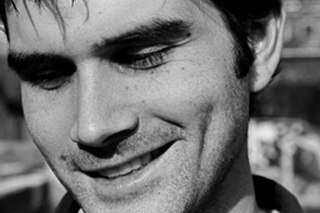 During his final semester, Auseon was afforded the opportunity to work with one of the most sought-after faculty members at Vermont, award-winning author M.T. Anderson.
During his final semester, Auseon was afforded the opportunity to work with one of the most sought-after faculty members at Vermont, award-winning author M.T. Anderson.
"He taught me the mechanics of writing," Auseon says of his work with Anderson. "He knows his writing inside and out, the nuts and bolts to a science. What he taught me is that once you know that science inside and out, you can forget about it and write from the inside and then not worry about whether the writing is good.
"He also taught me confidence in my own style and my own sense of humor. I discovered that you don't have to emulate anyone else or follow any of the trends.
"That was important because I've always liked to tell stories that I have in my head rather than trying to tell stories that have been told, but from a different perspective. I've always just had a way in which my world works and I like to go there to find my stories."
Another early influence to Auseon was Ron Koertge, a well-known poet and novelist.
"He taught me both the joy and the pain of doing serious, serious revision," Auseon says of Koertge. "One of the first things that he did with me was asked me to take 40 pages that I had written and cut it to 15. I had to figure out how those 15 were going to have everything that the 40 had. Once you do it, and you see how you can do it, you see how it improves the work."
In the winter of 2001, Auseon wrote the first scene to a book for a graduate school reading.
"I wrote it from scratch because I wanted to read something that no one had ever heard before," he says.
The scene centered on a main character who didn't say anything, but saw the entire world going on without him as he was completely forgotten.
"As I wrote the scene, I just happened to mention that the main character was sitting on a phone book while he was at the table," says Auseon. "I'm not really sure why that came about, but as I wrote the scenes, the main character kind of shrunk and shrunk because he was so overlooked and it became a size thing. So I decided to explore the connection between emotional growth and physical growth."
Having what he calls a "guarding angel in the publishing world," an editor just so happened to be in the room that night of the reading. That editor, Michael Stearns, would later offer to buy the book when Auseon completed the work late in 2003.
"He sent an email saying, 'The revision was really kick-ass, I think I want to buy the book if that's okay with you,' " remembers Auseon. "I wrote back and said, 'I think it's ok!' "
Auseon's first novel, Funny Little Monkey, is a story about twin brothers, one of whom has a growth hormone deficiency that keeps him four-foot two-inches tall, which is all the more striking when considering his bullying brother stands six-foot one-inch. The novel details the relationship between the two brothers as they struggle to get along during their adolescence.
"I think that it's probably the most autobiographical that I will ever get," Auseon says of the novel. "A lot of the locations used were from my hometown, it's set in a suburb in Ohio, and a couple of the actual scenes are taken directly from instances that happened to me.
"It was your typical first book. It was really rough. I rewrote it three or four times completely. It took me a long time to figure out what the story was and who the characters actually were."
Auseon says that he still learning how to deal with both positive and negative criticism.
"You're out there now and every other day is a good day or a bad day," he says. "The main thing is you just have to make yourself happy."
Just a few weeks ago, "Funny Little Monkey" was one of just six books nominated for Best Intermediate/Young Adult Book in the 2005 Borders Original Voices Awards. The honor is particularly satisfying to Auseon, who says that he enjoys writing for the younger generation.
"They are more willing to take risks and follow you wherever you want to go," he says. "I like that. With young people, you have this great opportunity to always be trying something new. I think so many of my ideas stem from when I was a kid. A lot of my ideas are so off the wall and so dramatic and so strange, that I felt my ideas always came in a way that kids would like."
- Comment








